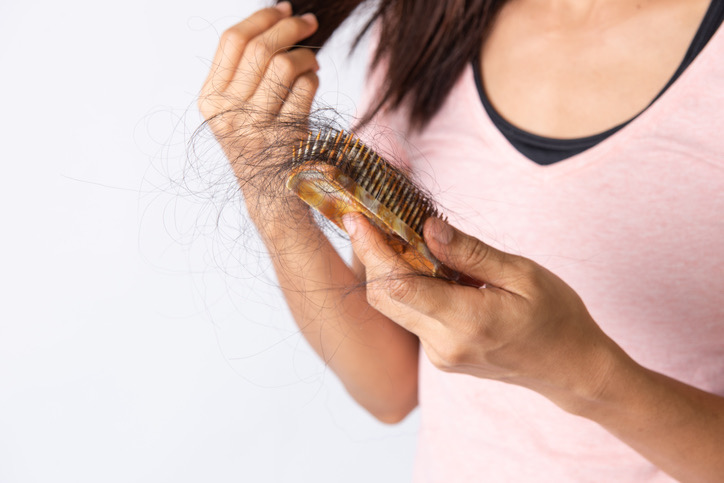Surprising Reasons Your Hair May Be Falling Out
It is common at menopause, but it’s not just your hormones that affect hair loss as you will see here.

It is always concerning when you start to see more hair in your hairbrush, or coming out in the shower.
Here are some reasons you may not have considered.
Medication
Check the side effects of the drugs you’re taking — hair loss may be on the list.
Particularly check if you are on medication for arthritis, depression, gout, heart problems, or high blood pressure.
Also acne medications high in vitamin A, or anabolic steroids
You are low in Iron
Iron helps keep your hair healthy and, most importantly, your body needs iron to make haemoglobin.
In women the most common cause of iron deficiency anaemia is a loss of iron in the blood due to heavy menstruation. When levels drop, so can your hair.
You’ll likely have other clues that low iron is to blame for your hair loss, like brittle nails, yellow or pale skin, shortness of breath, weakness, and a fast heartbeat.
Stress
If the stress is severe and ongoing it can sometimes make your body’s immune system turn on itself and attack your hair follicles.
Lots of worry and anxiety can also pause your hair growth, which makes hair more likely to fall out when you brush.
Weight loss surgery
You’re more likely to deal with this post-surgery symptom if your zinc levels are low, but it’s common to lose some hair after bariatric surgery.
Your doctor may recommend a zinc supplement to help halt your hair loss.
Low protein levels
A body low on protein finds a way to conserve where it can, and that includes halting hair growth.
About 2 to 3 months after that, hair starts to fall out. Adding more protein from meat, eggs, fish, nuts, seeds, and beans to your meals can pack more protein into your diet.
Birth control
At menopause many women use hormonal birth control such as oral contraceptives, implants, injections, vaginal rings and patches to help with heavy bleeding.
However these can trigger hair loss if you have a history of it in your family so discuss with your doctor a non-hormonal option such as a copper coil that may help you keep more of your hair.
Stopping hormonal birth control
Not only can starting hormonal birth control kick off hair loss, so can quitting.
You’ll probably notice a change several weeks or months after you stop.
Not being kind to your hair
Sometimes it’s your styling routine that’s to blame when your hair starts to break or fall out.
Using too much shampoo, brushing or combing your hair when it’s wet, rubbing hair dry with a towel, or brushing too hard or too often can all strain your strands and make them break.
Heat and chemicals
Daily use of blow-dryers and heated styling appliances can dry out your hair and make it easier for it to break and fall out.
Over use of bleach, hair dye, relaxers, and hair sprays can do the same thing.
Check your overall health
Hair loss is a symptom of more than 30 diseases, including PCOS (polycystic ovary syndrome), ringworm on your scalp, thyroid disorders, and autoimmune diseases.
You can also lose hair when you have the flu, a high fever, or an infection.
Smoking
Your hair isn’t immune to the damage smoking can cause to your overall health.
Toxins in cigarette smoke can interfere with your hair follicles and keep hair from growing and staying on your head.
Peri/Menopause
The shifting hormones during this time can speed up shedding but generally it should go away after about 6 months.
However if you notice your parting getting wider, or hair loss at the top and crown of your head, talk to your doctor.
You may have female pattern hair loss, which can be treated.
Eating disorders
Both anorexia (not eating enough) and bulimia (throwing up after you eat) can make your hair fall out because your body isn’t getting the nutrients it needs to grow and maintain healthy hair.
These are serious disorders and need to be treated by a team of health professionals, dieticians, and other medical specialists.
Alternative help
Of course hormones do play their part and low progesterone levels can be linked to hair loss, particularly in PCOS and at menopause, so do check this is not a reason.
Also scientists from the University of California, Irvine, gathered up past research into the effectiveness of more than 20 alternative hair loss remedies.
It found many had little evidence to suggest they worked or had been found to not work at all.
However, some alternative therapies in the test were looked on more favourably by the researchers.
As well as rosemary oil and caffeine, zinc, onion juice, the hormone melatonin, plant extract saw palmetto, pumpkin seed oil and marine proteins – supplements made from sharks and molluscs – were all found to have promise.
The scientists wrote: ‘Rosemary oil appeared to be a safe nonprescription alternative for [androgenetic alopecia], and the results of this study merit further investigation.’
They added: ‘Topical caffeine shows potential for hair loss’ and said more studies were needed.
Marine proteins led to ‘significant improvements’ in a trial, onion juice led to ‘full hair regrowth’ in some places and pumpkin seed oil ‘is a promising treatment’ for the top of the head, the study said.
Helpful information:
I hope this has given you some other factors to consider that might be relevant in your case.
Do make sure your stress levels, nutrition and hormone balance are all functioning optimally to reduce the risk of hair loss.
Women tend to underestimate the effect that stress has on their symptoms, but it affects everything from your hormones to your general health.
Your diet too is important, so here’s some extra help with that.
https://anna.blog.wellsprings-health.com/top-10-foods-for-healthy-hair/


















